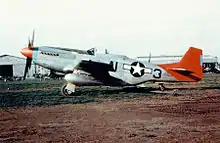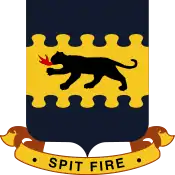William Bartley (pilot)
Captain William Bartley (1916-2011) was a World War II pilot with the Tuskegee Airmen. He graduated from the Tuskegee Institute in 1943, was given the rank of 2nd Lieutenant, and was placed with the 332nd Fighter Group and the 99th Fighter Squadron.[1][2]
Captain William Bartley | |
|---|---|
 William Roscoe Bartley | |
| Birth name | William Roscoe Bartley |
| Born | May 16, 1916 Jacksonville, FL |
| Died | January 28, 2011 (aged 94) Jacksonville, FL |
| Buried | Mill Creek Road Cemetery Eureka, Marion County, Florida, USA |
| Service/ | United States Army Air Force |
| Years of service | 1942-1950 |
| Rank | Captain |
| Unit | 332nd Fighter Group |
| Awards | |
Military service
World War II

The Tuskegee Airmen's aircraft had distinctive markings that led to the name, "Red Tails."[N 1]
Bartley Graduated as a pilot from Tuskegee in 1943. He was given the rank of 2nd Lieutenant and placed with the 332nd Fighter Group and the 99th Fighter Squadron.
After the war
After his service in World War II he joined the Air Force Reserve as a captain in 1946. Next he worked in real estate. In the 1960s he became the business manager of Edward Waters College. In the 1970s he opened his own real estate office (Bartley Real Estate.[4]
Awards
Education
- Old Stanton High School, Class of 1935
- School of Business Administration at Tuskegee Institute in 1939
- Tuskegee University Class of 1943[4]
References
- "Bartley, William Roscoe, Capt". airforce. Togetherweserved. Retrieved September 19, 2019.
- Caver, Joseph; Ennels, Jerome A.; Haulman, Daniel Lee (January 1, 2011). The Tuskegee Airmen: An Illustrated History, 1939-1949. NewSouth Books. p. 217. ISBN 978-1588382443.
- Rice, Markus. "The Men and Their Airplanes: The Fighters." Tuskegee Airmen, 1 March 2000.
- Kerr, Jessie-Lynne (February 4, 2011). "William Bartley, 1916-2011: Tuskegee Airman was Afro-American Insurance exec". Gatehouse Media LLC. The Florida Times Union. Retrieved September 19, 2019.
- Glassman, Matthew Eric. "Congressional Gold Medals, 1776-2016" (PDF). fas. Congressional Research Service. Retrieved September 19, 2019.
Notes
- The red markings that distinguished the Tuskegee Airmen included red bands on the noses of P-51s as well as a red rudder; their P-51B and D Mustangs flew with similar color schemes, with red propeller spinners, yellow wing bands and all-red tail surfaces.[3]
External links
- Tuskegee Airmen at Tuskegee University
- Tuskegee Airmen Archives at the University of California, Riverside Libraries.
- Tuskegee Airmen, Inc.
- Tuskegee Airmen National Historic Site (U.S. National Park Service)
- Tuskegee Airmen National Museum
- Fly (2009 play about the 332d Fighter Group)
- Executive Order 9981
- List of African American Medal of Honor recipients
- Military history of African Americans
This article is issued from Wikipedia. The text is licensed under Creative Commons - Attribution - Sharealike. Additional terms may apply for the media files.
